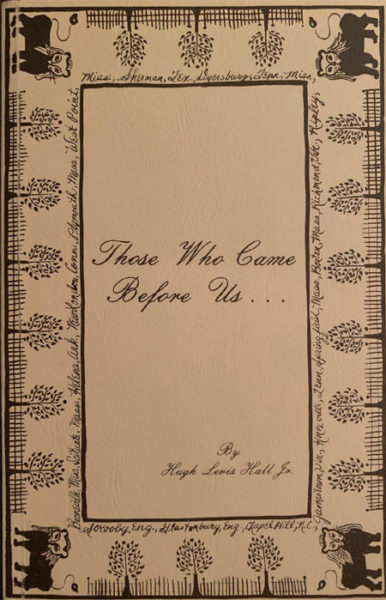
Genealogy is the study of families, family history, and the tracing of their lineages. All across America more and more people are digging into family history to determine just who their ancestors are so they can learn more about them and what their lives were like. Genealogy has been referred to as a doorway to the past. In fact it has been reported that in America genealogy is the second most popular hobby, the first is gardening.
In 1982 my dad finished a genealogy book he had been working on for several years, it is one of the best gifts he ever gave the members of our family. His book is titled Those Who Came Before Us and it traces our ancestors back to the late 1500s. In fact, a few years ago Jimmy Jack Beale heard about the book and asked me to help him come up with a name for a scholarship that would become one of the many scholarships awarded through the Sherman Ex-Student’s Association.

I suggested “Those Who Come After Us” since the scholarship would be helping the current and future Sherman graduates, the name made sense to us but it would almost have to be explained to everyone else as to just what it meant. Not too long after that at one of the association’s board meetings someone came up with the name “HOPE” for the scholarship which was much better.
HOPE stands for Helping Others Pursue Education, that particular scholarship is for those students who want to attend college or a trade school and are academically qualified but would not be eligible for one of the many academic, music, sports, or other scholarships awarded every year. It also benefits those graduates who just may not have the money to continue their education. Please contact me if you would like more information on the Hope Scholarship and/or the Sherman Ex-Student’s Association. I will be glad to help.
There are over 450 genealogical societies in the United States and each one belongs to the Federation of Genealogical Societies. Ancestry.com and Familysearch.org are two of the most popular genealogy research websites and they perform very similar functions, have similar technology bases, and coincidentally are also both located in Provo, Utah. Other highly recommended genealogy websites are http://www.findagrave.com/, http://www.fultonhistory.com,/ and U. S. GenWebProject. No one search site can contain everything, it’s best to use a combination of good reliable sources.
DNA stands for deoxyribonucleic acid, the molecule that contains the genetic code of organisms. DNA was first used in a criminal investigation in 1986. A person accused of a crime or even someone already in prison can be released through DNA evidence but they can’t be released through genealogy. Back in the 1920s scientists identified the four blood types to be A, AB, B, and O; this was a great advance in the medical field. Some people say the start of identifying people by blood types and other similar advancements made in every decade since led to the eventual detailed analysis of DNA. The discovery of DNA didn’t just stop there; advancements in DNA testing are being made all the time. This is a great help in both the field of law enforcement as well as the field of medicine. DNA testing is also often the first choice of many people who have been adopted as they search for their birth parents.
In my research for this column, I found http://www.geneticdigest.com to be an excellent source in learning how to choose a DNA testing company. The ten factors Genetic Digest ranks testing companies by are company reputation, services offered, testing method, software grade, research and scientific evidence, CLIA compliance, customer reviews, price, customer service, and return policy. They selected the top three DNA testing firms to be CRI Genetics, 23 and Me, and ancestrydna.com. By the way Clinical Laboratory Improvement Amendments (CLIA) regulates laboratory testing and requires clinical laboratories to be certified by their state as well as the Center for Medicare and Medicaid Services before they can accept any human samples for diagnostic testing.
I discovered that there is way too much information available to help a great deal in this short column about researching genealogy and DNA. There are some things that only genealogy research can tell you and there are some other things that only DNA testing can tell you. To me it seems like it would be best to use a combination of both genealogy research and DNA testing, however first do lots of checking to make sure the companies you will be using are both legitimate and reliable. Good luck in your searches.
If you have any comments or questions my e-mail address is deh63shs@yahoo.com.














